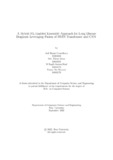| dc.contributor.advisor | Alam, Md. Golam Rabiul | |
| dc.contributor.advisor | Reza, Md Tanzim | |
| dc.contributor.author | Chowdhury, Asif Hasan | |
| dc.contributor.author | Islam, Md. Fahim | |
| dc.contributor.author | Riad, M Ragib Anjum | |
| dc.contributor.author | Hashem, Faiyaz Bin | |
| dc.date.accessioned | 2023-10-16T06:43:28Z | |
| dc.date.available | 2023-10-16T06:43:28Z | |
| dc.date.copyright | ©2022 | |
| dc.date.issued | 2022-09-28 | |
| dc.identifier.other | ID 18101278 | |
| dc.identifier.other | ID 18101501 | |
| dc.identifier.other | ID 18101472 | |
| dc.identifier.other | ID 18101278 | |
| dc.identifier.uri | http://hdl.handle.net/10361/21844 | |
| dc.description | This thesis is submitted in partial fulfillment of the requirements for the degree of Bachelor of Science in Computer Science, 2022. | en_US |
| dc.description | Cataloged from PDF version of thesis. | |
| dc.description | Includes bibliographical references (pages 38-39). | |
| dc.description.abstract | The significant advancements in computational power create the vast opportunity
for using Artificial Intelligence in different applications of healthcare and medical
science. A hybrid FL-enabled ensemble approach for lung disease diagnosis leveraging a combination of SWIN transformer and CNN is the combination of cutting-edge technology of AI and Federated Learning. Since,
medical specialists and hospitals will have shared data space, based on that data,
with the help of Artificial Intelligence and integration of federated learning, we can
introduce a secure and distributed system for medical data processing and create
an efficient and reliable system. The proposed hybrid model enables the detection
of COVID-19 and Pneumonia based on x-ray reports. We will use advanced and
the latest available technology that can help to fight against the pandemic that the
world has to fight together as a united. We focused on using the latest available
CNN models (DenseNet201, Inception V3, VGG 19) and the Transformer model
Swin Transformer in order to prepare our hybrid model that can provide a reliable
solution as a helping hand for the physician in the medical field. In this thesis, we
will discuss how the Federated learning-based Hybrid AI model can improve the
accuracy of disease diagnosis and severity prediction of a patient using the real-time
continual learning approach and how the integration of federated learning can ensure
hybrid model security and keep the authenticity of the information. | en_US |
| dc.format.extent | 51 pages | |
| dc.language.iso | en | en_US |
| dc.publisher | Brac University | en_US |
| dc.rights | Brac University theses are protected by copyright. They may be viewed from this source for any purpose, but reproduction or distribution in any format is prohibited without written permission. | |
| dc.subject | AI | en_US |
| dc.subject | VGG19 | en_US |
| dc.subject | Inception V3 | en_US |
| dc.subject | DenseNet201 | en_US |
| dc.subject | SWIN transformer | en_US |
| dc.subject | Feder- ated learning | en_US |
| dc.subject.lcsh | Biomedical engineering | |
| dc.subject.lcsh | Neural networks (Computer science) | |
| dc.title | A hybrid FL-enabled ensemble approach for lung disease diagnosis leveraging fusion of SWIN transformer and CNN | en_US |
| dc.type | Thesis | en_US |
| dc.contributor.department | Department of Computer Science and Engineering, Brac University | |
| dc.description.degree | B.Sc. in Computer Science | |

